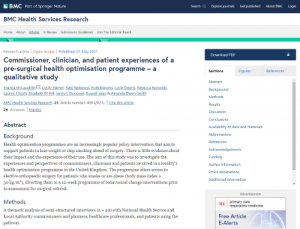Patients and healthcare professionals accepting of pre-surgery ‘health optimisation’ programme
5 May 2021
A ‘health optimisation’ programme in the Bath and North East Somerset area for patients who may need hip or knee surgery has been shown to be acceptable to patients and healthcare professionals, an ARC West and University of Bristol study has shown.
The researchers interviewed 13 professionals who had been involved in designing or delivering the local Clinical Commissioning Group’s (CCG) Getting Fit for Surgery programme, and seven patients involved in the programme.
These ‘health optimisation’ programmes vary from region to region, but usually offer support for patients to lose weight or give up smoking ahead of surgery. The programme we studied had introduced an extra 12 weeks ahead of referral to surgery, during which eligible patients were offered support from a ‘healthy lifestyles’ service. While the health benefits of achieving a healthy weight or stopping smoking are clear, some health professionals are concerned that such policies might also have harmful effects. This could include making access to surgery more difficult for certain groups in society and thus widening health inequalities.
Health optimisation programmes were acceptable to the participants interviewed in the context of hip and knee surgery. They felt that they offer a chance to support both short term weight loss or stopping smoking before surgery, and longer-term sustained changes to lifestyle and health after surgery. Patients in this study expected their doctors to raise weight management and smoking with them at the point they were referred to surgery. They didn’t find this problematic, with some stating they would welcome the offer of support at this point.
Health optimisation was successfully introduced as part of the region’s hip and knee surgery arrangements but had failed to be implemented for a wider range of conditions because not many people were referred to it. It was suggested that health optimisation during the ‘usual waiting time’ for surgery may be most acceptable to professionals and patients. The success of health optimisation was thought likely to be reliant on healthcare professionals’ support for the programmes and how well they are communicated to patients. Patients we interviewed generally hadn’t received much explanation of the programme and didn’t feel that they understood it well.
Patients and professionals supported the continuation of Getting Fit for Surgery and recognised the likely health and wellbeing benefits for most patients. They also accepted the money-saving reasons to introduce these programmes, to reduce the number of people needing surgery. They highlighted the need to personalise the support to patients to help them meet their goals and avoid creating inequalities.
Dr Joanna McLaughlin, NIHR Doctoral Clinical Research Fellow at Bristol Medical School, who led the research said:
“The interview part of our research into Getting Fit for Surgery has shown that patients broadly support the use of these kinds of interventions. They expect healthcare professionals to talk to them about weight and smoking before surgery anyway. People appreciated that these services could save the NHS money by helping some patients avoid surgery altogether and making surgery safer and more successful when it is needed.
“This work has already helped improve the Getting Fit for Surgery programme, and the findings can be applied to health optimisation programmes more generally. Our recommendations are that communications about such programmes are put across in a positive way that is tailored to the individual patient. Different types of support for healthy lifestyles, tailored to different groups – especially those experiencing health inequalities – could improve uptake of these kinds of programmes.
“Next we will be publishing our findings on the number of patients using the support on offer, what changes could be measured, and whether there were any differences in the number of patients needing surgery. I will also be looking at health optimisation programmes across England to see what else can be learned.”
Paper
